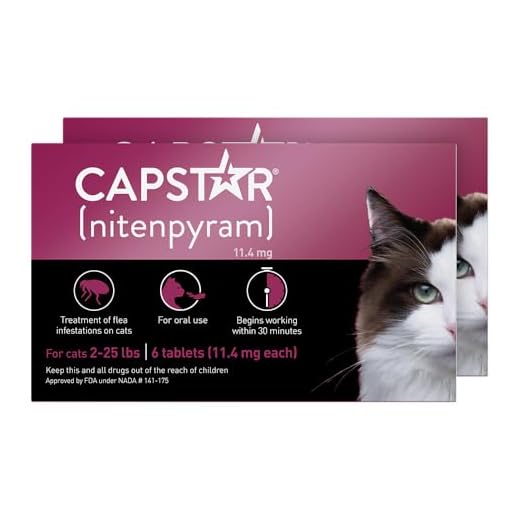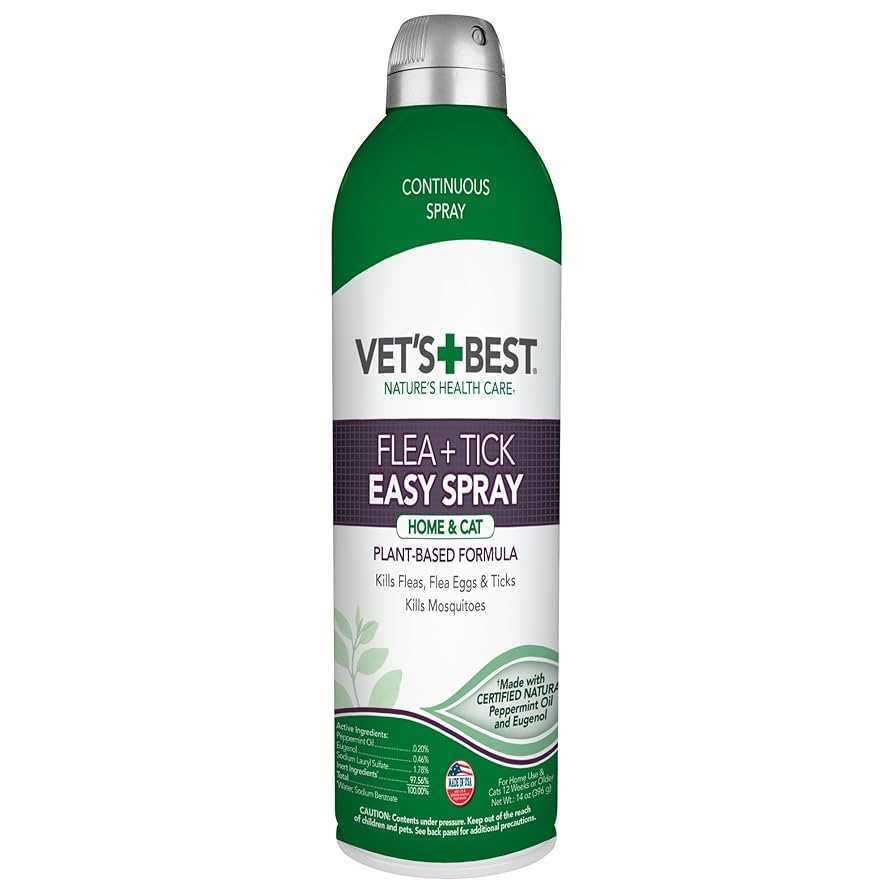




If you are seeking reliable options to combat unwanted parasites on your feline companion, this article presents valuable insights based on veterinary recommendations. Discover a range of products and methods that have been shown to help manage and prevent infestations, ensuring your pet’s comfort and health.
This piece is tailored for cat owners concerned about the well-being of their furry friends. Whether you are dealing with an existing issue or looking for preventive measures, you will find practical advice and suggestions to keep your cat safe from these nuisances.
The article covers various approaches, including topical applications, oral medications, and environmental controls. Each method is evaluated for its effectiveness, safety, and ease of use. By the end, you will have a clear understanding of your options and how to implement them, allowing you to make informed choices for your pet’s care.
Recommended Solutions for Cat Parasite Management
Consulting with a veterinarian can lead to effective strategies for managing parasites in felines. Many experts suggest a combination of topical applications and oral medications to achieve optimal results.
Regularly scheduled treatments are essential to prevent infestations. Many veterinarians advocate for monthly applications during warmer months, as this is when parasites are most active.
Common Approaches
- Topical Solutions: These are applied directly to the skin and provide protection for a month or longer. They kill existing parasites and prevent new ones from infesting the animal.
- Oral Medications: These are typically administered once a month and work systemically to eliminate parasites throughout the body.
- Collars: Special collars can release active ingredients that repel and kill parasites, lasting for several months.
- Environmental Control: Regular cleaning of the living space is crucial. Vacuuming carpets, washing bedding, and using appropriate sprays can significantly reduce the risk of reinfestation.
Each method has its pros and cons, which veterinarians can help evaluate based on the specific needs of the pet. It is also important to consider any underlying health issues that may affect the choice of product.
In conclusion, ongoing communication with a veterinary professional will ensure the chosen approach remains effective, adapting to any changes in the pet’s lifestyle or health status.
Recommended Prescription Medications by Veterinarians
Veterinarians often suggest specific prescription medications to combat parasites effectively. These products are formulated to provide comprehensive protection and are typically available only through veterinary clinics. Their efficacy is backed by clinical research and extensive testing.
Many of these medications work by targeting the nervous system of the parasites, leading to their elimination without harming the feline. Regular veterinary check-ups help ensure that the chosen solution remains appropriate for the age, weight, and overall health of the pet.
Commonly Prescribed Options
- Oral medications: These are ingested by the cat and provide systemic protection against infestations. They can offer a rapid response, often killing parasites within hours.
- Topical treatments: Applied directly to the skin, these solutions can be effective for both immediate and long-term control. They are often designed to repel and kill parasites on contact.
- Injectable options: Some veterinarians may recommend injections that provide prolonged protection, ensuring that the cat remains free from infestations for an extended period.
Consultation with a veterinarian is essential to determine the most suitable medication. Factors like lifestyle, potential allergies, and any existing health conditions can influence the choice of medication.
| Medication Type | Administration Method | Duration of Effect |
|---|---|---|
| Oral | Ingestion | Short to medium term |
| Topical | Skin application | Medium to long term |
| Injectable | Injection | Long term |
By following a veterinarian’s guidance, pet owners can ensure the health and comfort of their feline companions while effectively managing external parasites.
Effective Over-the-Counter Solutions for Flea Control
Over-the-counter products can provide significant relief from infestations caused by external parasites. Many of these options are readily available and can be utilized without a prescription. Selecting the right product is essential for ensuring the well-being of your pet.
Spot-on treatments are one of the most popular choices among pet owners. These solutions are applied directly to the skin, usually between the shoulder blades, and work by dispersing through the pet’s natural oils. They offer prolonged protection and help eliminate adult parasites as well as their eggs.
Oral Medications and Shampoos
Oral medications are another alternative that can effectively combat unwanted pests. These pills often contain ingredients that disrupt the life cycle of the parasites, preventing them from reproducing. Regular administration as per instructions ensures ongoing protection.
Shampoos formulated to eliminate parasites can provide immediate relief. When used properly, these products can effectively wash away existing pests while also leaving the coat clean and fresh. Regular bathing with these shampoos can help maintain a pest-free environment.
- Choose products specifically labeled for your pet’s weight and age.
- Follow the application instructions closely to ensure safety and efficacy.
- Consider combining different types of treatments for a comprehensive approach.
Always consult with a veterinarian if any adverse reactions occur or if the infestation persists despite treatment. Regular check-ups and preventive care can significantly reduce the likelihood of future issues.
Natural Remedies Endorsed by Animal Health Professionals
Consulting with animal health experts reveals that certain natural solutions can aid in the management of external parasites. Essential oils, such as lavender and cedarwood, are often recommended for their repellent properties. These oils can be diluted and applied to pet bedding or used in diffusers to create a less inviting environment for pests.
Another approach involves the use of diatomaceous earth, a natural powder made from fossilized algae. It can be safely sprinkled in areas where pets frequent, as it works by damaging the outer shell of insects, leading to dehydration. This method is both non-toxic and effective, making it a popular choice among veterinarians.
Herbal Options and Home Remedies
Herbal remedies are increasingly recognized for their potential benefits. Some professionals suggest the use of garlic in moderation, as it may help deter unwanted insects. However, it is crucial to consult with a veterinarian to determine the proper dose, as excessive amounts can be harmful.
- Apple cider vinegar: Mixing a small amount with water and spraying it onto the coat can create an unfavorable environment for parasites.
- Neem oil: Known for its insecticidal properties, it can be diluted and used as a topical treatment.
- Rosemary: This herb can be brewed as a tea and applied to the skin to provide relief and deter pests.
While natural remedies can be beneficial, it’s essential to monitor your pet for any adverse reactions. Always consult with a veterinary professional before implementing new treatments. Combining these methods with regular grooming and hygiene practices will enhance their effectiveness.
Comparative Analysis of Flea Solutions: Efficacy and Safety
For optimal results, consider topical solutions, oral medications, and collars as primary options. Topical solutions offer rapid action, while oral medications provide lasting results. Collars are a convenient choice for continuous protection.
Each product varies significantly in terms of active ingredients, mode of action, and potential side effects. It is crucial to assess both efficacy and safety before selection. Consult with a veterinarian to tailor the choice to your pet’s specific needs.
Summary of Key Findings
- Topical Solutions: Act quickly, typically within hours. Common ingredients include fipronil and imidacloprid.
- Oral Medications: Provide long-lasting effects, with options such as nitenpyram and spinosad. These may take longer to show results but offer extended protection.
- Collars: Convenient for ongoing control. Ingredients like flumethrin and imidacloprid are effective, with effects lasting several months.
When evaluating any option, monitor your pet for adverse reactions, and consult a veterinarian promptly if any issues arise. The right choice will depend on individual circumstances, lifestyle, and any existing health considerations.
Best flea treatment for cats from vets
Features
| Part Number | 86336774 |
| Model | 86336774 |
| Color | Large Cat only |
| Release Date | 2023-05-29T00:00:01Z |
| Size | 6-Pack |
| Language | English |
Features
| Part Number | 3137 |
| Model | 3137 |
| Warranty | Contact the manufacturer. |
| Color | Pink |
| Size | 12 Count |
Features
| Part Number | 100503549 |
| Model | 100503549 |
| Warranty | Satisfaction 100% guranteed or your money back. |
| Color | Clear |
| Size | 1 Gallon |
Features
| Part Number | LG001 |
| Model | LG001 |
| Warranty | 30 Day Manufacturer |
| Color | Cedarwood |
| Size | 16 Fl Oz (Pack of 1) |
Features
| Part Number | 004FLTSP-CAT |
| Model | P004FLTSP6-CAT |
| Color | Green |
| Size | 6 Count |
Video:
FAQ:
What are the most recommended flea treatments for cats by veterinarians?
Veterinarians often recommend several flea treatments for cats, including topical solutions like Frontline and Advantage, as well as oral medications such as Comfortis and Capstar. These products are formulated to kill fleas quickly and can prevent future infestations. It’s important to choose a treatment that is appropriate for your cat’s age, weight, and health status, so consulting with your vet is advisable to ensure the best choice for your pet.
How do I know if my cat has fleas and needs treatment?
Signs that your cat may have fleas include excessive scratching, biting at their skin, and visible flea dirt (small black specks) on their fur. You might also notice fleas jumping in their fur or find them on your bedding or furniture. If you suspect your cat has fleas, it’s best to consult with your veterinarian for an examination and to discuss appropriate flea treatments.
Are there any natural flea treatment options for cats?
Yes, there are several natural flea treatment options available, such as diatomaceous earth, which can be sprinkled in areas where fleas are present, and essential oils like lavender and cedarwood, which may repel fleas. However, it’s crucial to use these products carefully, as some essential oils can be toxic to cats. Always consult your veterinarian before trying natural remedies to ensure they are safe for your pet.
How often should I treat my cat for fleas?
The frequency of flea treatments can vary depending on the product used. Generally, topical treatments are applied once a month, while oral medications may have different schedules. It’s important to follow the instructions on the product label and consult with your veterinarian about how often to treat your cat based on their specific needs and local flea prevalence. Regularly checking your cat for fleas and maintaining a clean living environment can also help reduce the need for frequent treatments.









